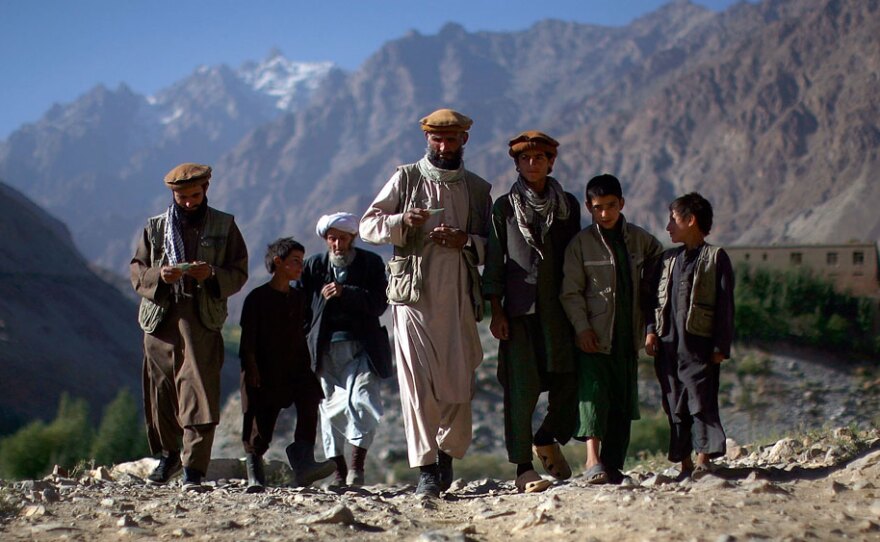The counting is under way after millions of wary Afghan voters turned out to cast ballots Thursday in the country's second-ever presidential election despite sporadic militant attacks that killed 26 people.
After the polls closed, President Hamid Karzai hailed the election, saying "the Afghan people dared rockets, bombs and intimidation and came out to vote."
But threats of violence apparently kept many people from the polls, prompting election officials to keep voting centers open for an extra hour.
"Overall, the security situation has been better than we feared," said Kai Eide, head of the United Nations mission in Kabul.
Despite a massive military and police presence to protect the balloting, security officials say eight Afghan soldiers, nine police and nine civilians died in bombings and other attacks, according to The Associated Press.
Analysts say a weak turnout could keep Karzai from getting more than 50 percent of the vote. Karzai needs a majority of the vote to avoid an Oct. 3 runoff with his nearest rival, former foreign minister Abdullah Abdullah.
Afghanistan's Independent Election Commission says preliminary results could be available by Saturday, although the official results won't be complete until early September.
NPR's Jackie Northam reported from the Afghan capital, Kabul, that voter turnout was low in the opening hours of the election. She said election officials predicted that many people would stay home until they saw that the balloting was proceeding safely.
Not everyone was scared away. "One of my professors told me it was my responsibility to vote," Mariam Waheedeearh, a 20-year-old law student, told Northam.
Waheedeearh came to the polling station with her sisters, brothers and parents. "The Taliban are trying to scare people, but everyone should come to vote," she said.
Some 17 million people were reportedly registered to take part in the balloting, in which they also chose members of the country's 34 provincial councils.
Militants launched attacks around the country amid a government attempt to ban reports of violence that might further dampen voter turnout. Northam said that both international and domestic news media had decided to defy the government ban.
In the southern city of Kandahar, NPR's Soraya Sarhaddi Nelson reported that voters were trickling into polling places despite "about a dozen" explosions heard in various parts of the city.
Kandahar is known as the birthplace of the Taliban, and many of the surrounding southern provinces are strongly influenced or controlled by militants, who threatened to attack anyone attempting to vote.
The Associated Press reports that election officials in the city said voter turnout appeared to be about 40 percent lower than it was during the last presidential election in 2004.
Nelson said security was tight in the central part of Kandahar, with many Afghan police and army checkpoints. She said there was very little sign of U.S. or NATO troops. "The foreigners want to make sure they don't appear to be part of this election. They really want this to be about Afghans, for Afghans," she said.
Despite that concern, The Associated Press reported that U.S. Marines delivered presidential ballots by helicopter to the town of Dahaneh, in Helmand province, which was recently recaptured from Taliban fighters. International monitors generally disapprove of foreign military personnel having any involvement in the custody of ballots.
Nelson noted that although Afghan election officials said most polling places were open, those assertions were suspect, given the government's attempt to suppress reports of violence.
She reported visiting one polling center for women, where she saw very few people. "It's interesting to note that the ballot boxes were very full," Nelson said, "which raises the question of whether there is in fact the transparency and fairness and honesty that the Afghan government says it wants to see in this election."
Turnout was reported to be stronger in the northern parts of Afghanistan, where security is generally better.
NPR's David Gilkey, reporting from a market town in northeastern Badakhshan province, said eager voters congregated outside one polling place an hour before it was scheduled to open.
Gilkey said the vote posed thorny logistical problems in remote areas, where unusually heavy snowfall and rains this spring virtually obliterated many recently built roads. Hundreds of donkeys were used to carry election materials and ballots to villages that aren't accessible by road.
Those logistical problems are likely to slow efforts to get voting results back to the capital city.
Hundreds of thousands of Afghans had no hope at all of voting in this election. They are part of the estimated 1.7 million Afghan refugees still living in Pakistan.
During the last presidential election, in 2004, arrangements were made to allow the refugees to cast their ballots from Pakistan. NPR's Phillip Reeves reported that this time, Afghan election officials decided that it would be too expensive.
The Independent Election Commission estimated that it would have cost $50 million to bring the election to the refugees, and that international donors couldn't come up with the money.
Reeves said most Afghan refugees he spoke with in Pakistan said they would have voted for Karzai, a Pashtun like themselves.
Copyright 2023 NPR. To see more, visit https://www.npr.org. 9(MDAzMjM2NDYzMDEyMzc1Njk5NjAxNzY3OQ001))






